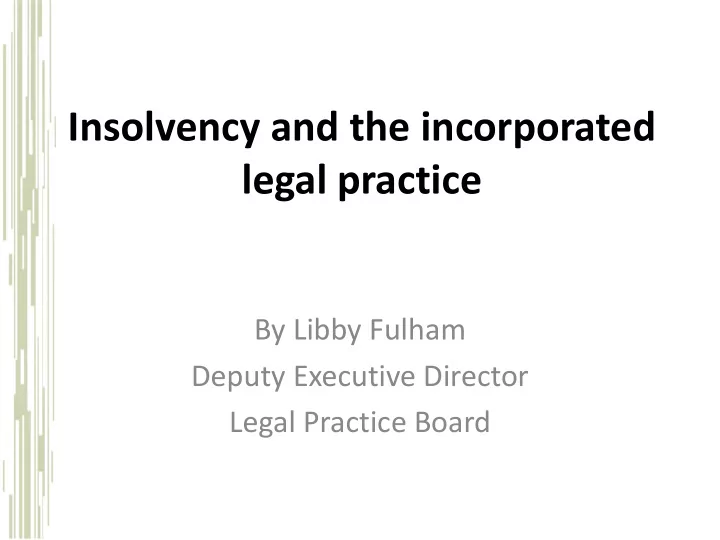

Insolvency and the incorporated legal practice By Libby Fulham Deputy Executive Director Legal Practice Board
Provisions in legal profession legislation • Law practice includes an incorporated legal practice. • An incorporated legal practice must have at least 1 legal practitioner director. • All other practitioners may be principal in nature, not in practice. • An insolvent corporation may have administrators or liquidators appointed. • The Board (regulator) may appoint an external intervener.
General principles Nature of client files • Documents • Electronic records. • Hard copy documents may belong to client or practice. • Documents created before retainer are held as agent. • Need to identify the party for whose benefit the document is prepared (lawyer or client).
General principles Position of liquidators • Definitions of ‘books’ (s 9 Corporations Act). • Requirement to take possession of ‘books’ of the Company (s 474 Corporations Act). • Requirement to take possession of ‘books’ relevant to the winding up of the Company. • Requirement to have sufficient funds before incurring expense (s 545 Corporations Act). • Court ordered direction and disposal of uncollected goods. • Indemnification for costs of disposal of property.
General principles Position of External Interveners (Managers) • Powers set out under legal profession legislation. • Access to client files and associated documents, and information. • Position as bailee. • Return of files.
General principles Position of practitioners of ILP • Fundamental ethical obligations. • Position under legal profession legislation and conduct rules. • Position as practitioner with designated responsibility for active and archive files. • Additional responsibility for tax, limitation periods, Will files, assessing any cause of action that may be brought.
Issues Terms of Retainer • Terms on: – Ownership. – Return. – Storage. – Destruction.
Issues Ownership of property • Is the file owned by the client, Company or Managers? • Dependant on content of file. • No basis to say manager owns property in file.
Issues Possession of client files • Is the file in the possession of the liquidators, Company or Managers? • Element of control on release of files by liquidators. • Property of files remains with the liquidators. • Access to is not equivalent to possession.
Issues Are files ‘books’ of Company? • Client files must contain at least in art property of the Company. • Documents owned by clients does not abrogate liquidator’ responsibility to take possession of and retain client files, or to ensure the ‘books’ are retained. • Manager may require ‘any other person’ who has or has had control of client files to grant access. • Control over access is not a criticism of liquidator or holding documents belonging to the client. • Practitioner’s responsibility for retention of documents does not abrogate liquidators’ responsibility either.
Issues Are the Managers or Regulator obliged to retain the client files? • Falsehood in assertion the manager/regulator must comply with conduct rules. • Copies are not the property of the Company or client. • In absence of other person obliged to store files, regulator may (through Managers) retain the files. • Purpose of the legal profession legislation in protecting the interests of the clients.
Issues Reimbursement for storage costs • Indemnification for costs from assets of the Company. • Intermingled documents, may require directions from the Court, as to: – Indemnity and lien for costs. – Writing to clients seeking retrieval of files or consent to destruction. – Advertising for clients to retrieve files. – Relief from further storage obligations. • Instead, liquidators sought reimbursement for storage costs from the Managers. • No compelling power to make liquidators seek directions. • Options, to negotiate sharing of storage costs or require practitioners to take possession.
Issues Responsibility of practitioners • Obligations under Conduct Rules. • Ability to enforce such obligations. • Issues of misconduct for failing to meet professional ethical obligations.
Update on current situation
Issues Deficiency of legislation • Obligations rest with the practitioners not the law practice. • Taking possession of files when not the owner of the files. • Interstate legal practitioner director. • Reimbursement for costs of intervention may not be recoverable under provisions in the legal profession legislation.
Pop Quiz How many directors can an incorporated legal practice have?
Pop Quiz Name one direction a liquidator can seek from the Court in relation to documents of the Company in liquidation?
Pop Quiz Are client files ‘books’ of the Company in liquidation?
Pop Quiz Is it relevant that a principal practitioner of a law practice may be able to abandon the files of a practice and continue practising under an new practice structure?
Questions
Recommend
More recommend